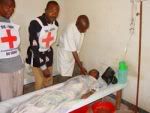 I blogged a few months ago about a case of plague (due to the bacterium, Yersinia pestis) in a woman in California. I'm still doing some reading for the promised post on Black Death, CCR5, and other topics discussed in the comments section, but in the meantime, I wanted to alert y'all to an ongoing outbreak of the disease (in the pneumonic form, meaning the bacteria is present in the lungs and therefore is person-to-person transmissible) in the Democratic Republic of Congo:
I blogged a few months ago about a case of plague (due to the bacterium, Yersinia pestis) in a woman in California. I'm still doing some reading for the promised post on Black Death, CCR5, and other topics discussed in the comments section, but in the meantime, I wanted to alert y'all to an ongoing outbreak of the disease (in the pneumonic form, meaning the bacteria is present in the lungs and therefore is person-to-person transmissible) in the Democratic Republic of Congo:
The sole aid agency fighting an outbreak of pneumonic plague in the remote lawless corner of the Democratic Republic of Congo sent out an urgent plea for help Thursday.French medical charity Medecins Sans Frontieres warned that unless it received help in tracking down new cases and anyone who may have been in contact with them, the outbreak in Congo's Ituri district could spiral out of control.
Twenty-two people have already been killed by the highly contagious airborne disease since the beginning of June. Meanwhile, another 144 cases have been confirmed in Ituri, a district in the remote northeast where militia groups still operate.
If treated early with antibiotics, patients with pneumonic plague have a high likelihood of surviving. However, left untreated, there is a very high mortality rate. The concern right now is that those in the infected area (where bubonic plague is endemic) could spread it to other areas of the country:
And MSF fears that unless urgent measures are taken by U.N. and government health officials, the outbreak might spread to areas that doctors will not be able to access due to militia activity.
However, much of the focus in Congo at the moment is on organizing presidential and parliamentary elections, which are due to take place on July 30.
The polls are meant to provide the former Belgian colony with a fresh start after decades of dictatorship, war and chaos.
I specifically mentioned the DRC in the post I wrote about war and disease. They've suffered outbreaks of many emergent diseases, including Ebola and Marburg, partly due to the political chaos and instability in the region (making it difficult or impossible to identify and stop these outbreaks early, when the most effective control measures can be put in place). An outbreak in the same area in early 2005 killed at least 61 individuals before it was brought under control. The outbreak currently is bad, and without additional aid, could get even worse.

Hi, Tara. Do I understand correctly that pneumonic plague is one of the most contagious diseases there is?
The father of one of my high school friends had bubonic plague in the early sixties. He was a zoologist who did his doctoral work on the population dynamics of prairie dogs (among whom plague is endemic). We were all very impressed.
The Coconino County Health Dept. (northern Arizona, USA)
announced yesterday that they have confirmed a case of
plague in a cat from Winona (10 miles from Flagstaff)
("winslow Arizona - don't forget Winona - Get your kicks....
on Route Sixty-Six!")
The cat evidently got it from nearby infected prarie dog burrows.
A case of fatal pneumonic plague killed a vetenarian some years
ago in (Tucson? I disremember...) after being sneezed on by a cat
he was "rescuing" from under a house.
This is one way that Yersinia infected fleas come in contact with
humans in the Southwest USA.
miserable little ungrateful flea-infested felines........
I don't know any specific stats on numbers of secondary cases, but it certainly ranks up there.
Regarding the cat, I was just reading about the older case of that the other day...can't recall the source, though. (I've been going through lots of books and articles on the topic). Infected fleas will definitely stick around for awhile, even if the host dies or abandons the burrow, so they're an ongoing problem and, as you note, will bite more than just their usual host.